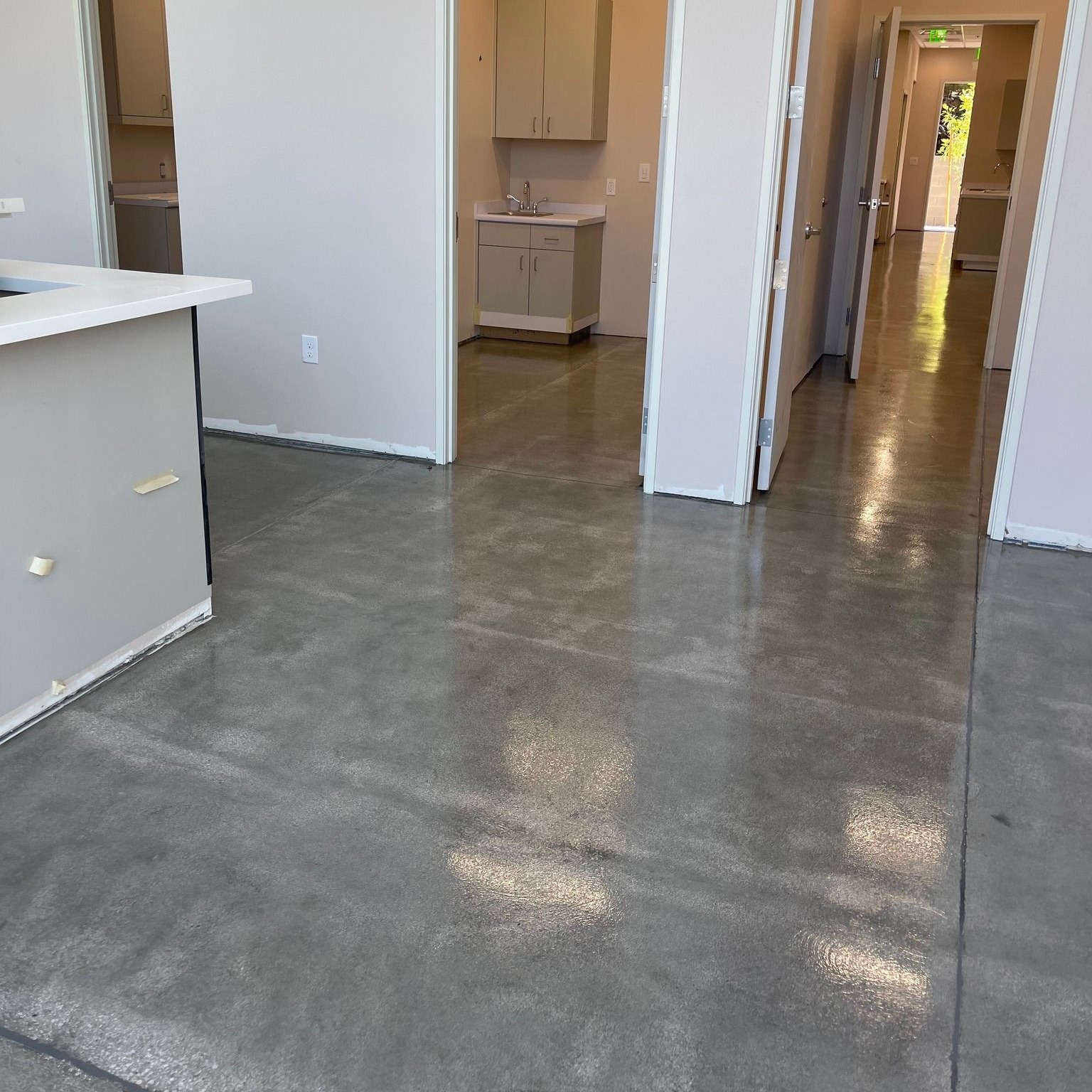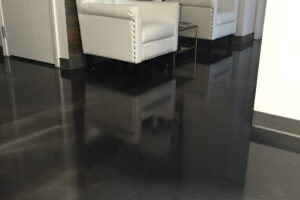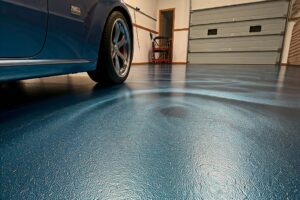Epoxy floor coatings have transformed the flooring landscape, offering a seamless combination of resilience, aesthetic appeal, and adaptability. Whether you’re upgrading a mundane garage into a polished, professional workshop or adding a sleek, modern finish to your interiors, epoxy flooring delivers unmatched results. But how much does it cost? Is it worth the investment? And how does it compare to other options?
What Is Epoxy Floor Coating?
Epoxy floor coating is a specialized surface application that merges resin and a hardener to create a robust, chemical-resistant layer over concrete or other surfaces. Unlike paint, epoxy forms a bond with the substrate, creating a hardened, plastic-like layer that enhances both the strength and aesthetics of the floor. It’s available in various finishes, from glossy metallics to textured flakes, making it a versatile choice for garages, basements, kitchens, and commercial spaces.
Benefits of Epoxy Floor Coating
1. Superior Durability
Epoxy flooring is engineered to endure. Its resistance to abrasion, heavy loads, and chemical spills makes it ideal for spaces subjected to rigorous wear and tear. From the weight of vehicles in garages to high foot traffic in commercial establishments, epoxy handles it all with remarkable resilience.
2. Visual Appeal and Customization
Epoxy floors are a canvas for creativity. Whether you prefer the understated elegance of solid colors or the eye-catching allure of metallic swirls and decorative flakes, epoxy offers endless design possibilities. It’s an easy way to personalize your space while maintaining a professional finish.
3. Easy Maintenance
Epoxy’s smooth, non-porous surface resists stains, making it effortless to clean. Spills, dust, and debris can be wiped away with minimal effort, saving time and ensuring your floors remain pristine with little upkeep.
4. Longevity and Cost Efficiency
Though the upfront cost of epoxy flooring may be higher than traditional options like tiles or vinyl, its durability and minimal maintenance requirements make it a cost-effective solution in the long run. A well-installed epoxy floor can last 10 to 20 years, offering outstanding value over its lifespan.
5. Safety Features
Slip resistance can be enhanced by incorporating textured additives into the epoxy mixture. This makes it a safer option for areas prone to moisture, such as garages or basements.
6. Environmental Benefits
Modern epoxy coatings are formulated to be low in volatile organic compounds (VOCs), making them safer for indoor air quality and reducing environmental impact. Its durability also reduces the need for frequent replacements, minimizing waste.
Epoxy Floor Coating for Garages
The garage is no longer just a utilitarian space for parking cars and storing tools. It has become an extension of the home, often doubling as a workshop, gym, or hobby space. Epoxy garage floor coatings provide the following advantages:
- Chemical Resistance: Automotive fluids, cleaning agents, and other harsh chemicals can wreak havoc on traditional concrete. Epoxy provides a robust shield that resists staining and deterioration.
- Enhanced Lighting: The reflective surface of epoxy floors can significantly brighten your garage, reducing the need for additional lighting and making the space more inviting.
- Customizable Aesthetics: From sleek monochromatic finishes to vibrant chip patterns, epoxy allows homeowners to match the garage’s design with the rest of the house.
- Impact Resistance: Heavy tools, dropped equipment, and the weight of vehicles are no match for epoxy’s strength, ensuring your garage floor remains undamaged over time.
Costs of Epoxy Flooring
Understanding the Costs
Epoxy flooring costs are influenced by several factors, including:
- Area Size: Larger spaces generally cost more, though volume discounts may apply for expansive installations.
- Epoxy Type: Basic epoxy coatings are affordable, while decorative finishes like metallic or quartz epoxy are priced higher due to the materials and labor involved.
- Labor Costs: Professional installation ensures optimal results but adds to the expense. DIY kits are available but may lack the durability and precision of a professionally installed floor.
Price Breakdown
The average cost for epoxy flooring in residential garages ranges between $3 and $12 per square foot, with the following considerations:
- Basic solid epoxy: $3–$5 per square foot
- Decorative flake epoxy: $5–$8 per square foot
- High-end metallic epoxy: $8–$12 per square foot
For a typical two-car garage (about 400 square feet), the cost can range from $1,200 to $4,800, depending on the finish and labor.
Epoxy Floors for Interiors
Using epoxy inside homes is a growing trend among modern homeowners, particularly for:
1. Kitchens and Bathrooms
Epoxy flooring in kitchens and bathrooms offers a seamless, waterproof surface that’s resistant to stains and spills. Its glossy finish adds a touch of sophistication while remaining highly practical.
2. Living Rooms
Metallic epoxy floors create a dramatic and contemporary aesthetic in living spaces. Paired with minimalist furniture, they can transform a room into a stylish haven.
3. Basements
Basements often contend with moisture issues, which can lead to mold and mildew. Epoxy’s water-resistant properties make it an excellent choice for this area, ensuring durability and easy maintenance.
4. Commercial Spaces
In retail stores, offices, and warehouses, epoxy flooring combines functionality with aesthetic appeal. The customizable designs can reflect brand identity while the tough surface withstands daily wear.
Types of Epoxy Floor Coatings
1. Solid Color Epoxy
Ideal for a clean, minimalist look, this type of epoxy offers a smooth, uniform surface. It’s perfect for garages and industrial spaces where functionality is paramount.
2. Metallic Epoxy
Known for its striking appearance, metallic epoxy creates a flowing, three-dimensional look reminiscent of molten metal or ocean waves. It’s a popular choice for high-end interiors and showrooms.
3. Flake Epoxy
This type incorporates small colored flakes into the epoxy, adding texture and a decorative touch. The flakes enhance slip resistance and are often used in garages and workshops.
4. Quartz-Filled Epoxy
Quartz epoxy combines resin with quartz granules for extreme durability and slip resistance. It’s ideal for commercial kitchens, locker rooms, and other high-traffic areas.
Epoxy Floor vs. Garage Floor Epoxy
Epoxy Floor:
This term encompasses all epoxy applications, whether in residential interiors, commercial spaces, or industrial settings. It focuses on versatility, allowing for a variety of finishes and uses.
Garage Floor Epoxy:
Specifically formulated for garage applications, this type emphasizes durability and chemical resistance. Features like flake finishes and anti-slip additives make it especially suited for automotive and workshop environments.
Common Questions About Epoxy Flooring
- Is it expensive to epoxy a floor?
The cost varies but typically ranges from $3 to $12 per square foot. While the upfront expense may seem high, the long-term durability and low maintenance make it a cost-effective choice. - Is epoxy flooring a good idea?
Yes, epoxy flooring is a great option for those seeking a durable, easy-to-maintain, and visually appealing surface. It’s suitable for garages, basements, kitchens, and commercial spaces. - What does epoxy do to a floor?
Epoxy strengthens the surface, creating a durable, stain-resistant, and easy-to-clean finish. It also enhances the floor’s aesthetics, offering various design options. - What is the disadvantage of epoxy flooring?
The primary disadvantages include potential slipperiness when wet, the need for professional installation for optimal results, and susceptibility to UV discoloration in outdoor areas. - Is it worth it to epoxy your garage floor?
Absolutely. Epoxy garage floors enhance durability, resist staining, and add visual appeal, making them a valuable investment for homeowners. - How much does it cost to put epoxy on a garage floor?
Costs typically range from $1,200 to $4,800 for a standard two-car garage, depending on the type of epoxy and installation method. - What kind of epoxy is best for a garage floor?
Two-part epoxy systems with added flakes or quartz are ideal for garages due to their strength and slip-resistant properties. - What are the disadvantages of epoxy flooring in a garage?
Potential downsides include the possibility of slipperiness, sensitivity to UV light, and the need for a clean and dry surface during installation to ensure proper adhesion.
Preparing for Epoxy Installation
Before applying epoxy, the floor must be thoroughly cleaned and prepped. This involves:
- Cleaning: Remove oil stains, grease, and dirt.
- Repairing Cracks: Fill any cracks or holes to ensure a smooth application.
- Etching or Grinding: Roughen the surface for better adhesion.
Proper preparation is essential for a long-lasting and flawless epoxy floor. While DIY kits are available, professional installation ensures the best results.
Epoxy floor coatings are a game-changer for garages and interiors alike. From their remarkable durability to their limitless design possibilities, epoxy floors offer a perfect blend of functionality and style. While they require a financial investment upfront, the long-term benefits—including minimal maintenance and extended lifespan—make them a superior choice for homeowners and businesses. Whether you’re upgrading your garage, revitalizing your basement, or adding a touch of luxury to your interiors, epoxy flooring is a decision that pays off in aesthetics and practicality.
So, why wait? Transform your space with the unparalleled versatility of epoxy flooring today!







Leave a Reply
Your email is safe with us.